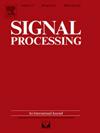具有未知后变化参数的传感器网络快速变化检测的MD-GRao算法
IF 3.6
2区 工程技术
Q2 ENGINEERING, ELECTRICAL & ELECTRONIC
引用次数: 0
摘要
考虑传感器网络中的快速变化检测(QCD)问题,用于监测具有未知后变化参数的信号中的突然参数变化,其中变化可能很微妙。传统的方法,如基于广义似然比测试的QCD (GLRT-QCD),通常在计算上不适合实时应用。基于Rao测试的QCD (Rao-QCD)虽然更简单,但会导致更高的误报率和更长的延迟。为了解决这些限制,我们提出了一种改进的面向漂移的广义Rao (MD-GRao)算法,该算法在计算复杂性和检测效率之间取得了很好的平衡,可以应用于一般情况。本文首次分析了Rao-QCD的漂移特性,揭示了其统计量的单调递增性质。基于这一见解,我们提出了一种动态窗口更新策略来有效地估计未知参数,并开发了一种包含负漂移机制的递归更新方法,从而能够快速识别潜在的变化。理论分析证明了该算法的渐近性能,而基于雷达传感器网络的心率变化检测的综合数值评估证明了其优于传统方法的计算效率。本文章由计算机程序翻译,如有差异,请以英文原文为准。
An efficient MD-GRao algorithm for quickest change detection in sensor networks with unknown post-change parameters
Consider a quickest change detection (QCD) problem in sensor networks for monitoring a sudden parameters change in signals with unknown post-change parameters, where the change may be subtle. Traditional approaches, such as the generalized likelihood ratio test-based QCD (GLRT-QCD), are often computationally prohibitive for real-time applications. The Rao test-based QCD (Rao-QCD), though simpler, results in higher false alarm rates and longer delays. To address these limitations, we propose a modified drift-oriented generalized Rao (MD-GRao) algorithm, which strikes a well-balanced tradeoff between computational complexity and detection effectiveness, and can be applied to general cases. For the first time, we analyze the drift property of Rao-QCD and reveal the monotonically increasing nature of its statistic. Based on this insight, we propose a dynamic window update strategy to efficiently estimate unknown parameters and develop a recursive update approach that incorporates a negative drift mechanism, enabling rapid identification of the potential change. Theoretical analysis establishes the asymptotic performance of the proposed algorithm, while comprehensive numerical evaluations of heart rate change detection in a radar-based sensor network demonstrate its superior computational efficiency over traditional methods.
求助全文
通过发布文献求助,成功后即可免费获取论文全文。
去求助
来源期刊

Signal Processing
工程技术-工程:电子与电气
CiteScore
9.20
自引率
9.10%
发文量
309
审稿时长
41 days
期刊介绍:
Signal Processing incorporates all aspects of the theory and practice of signal processing. It features original research work, tutorial and review articles, and accounts of practical developments. It is intended for a rapid dissemination of knowledge and experience to engineers and scientists working in the research, development or practical application of signal processing.
Subject areas covered by the journal include: Signal Theory; Stochastic Processes; Detection and Estimation; Spectral Analysis; Filtering; Signal Processing Systems; Software Developments; Image Processing; Pattern Recognition; Optical Signal Processing; Digital Signal Processing; Multi-dimensional Signal Processing; Communication Signal Processing; Biomedical Signal Processing; Geophysical and Astrophysical Signal Processing; Earth Resources Signal Processing; Acoustic and Vibration Signal Processing; Data Processing; Remote Sensing; Signal Processing Technology; Radar Signal Processing; Sonar Signal Processing; Industrial Applications; New Applications.
 求助内容:
求助内容: 应助结果提醒方式:
应助结果提醒方式:


